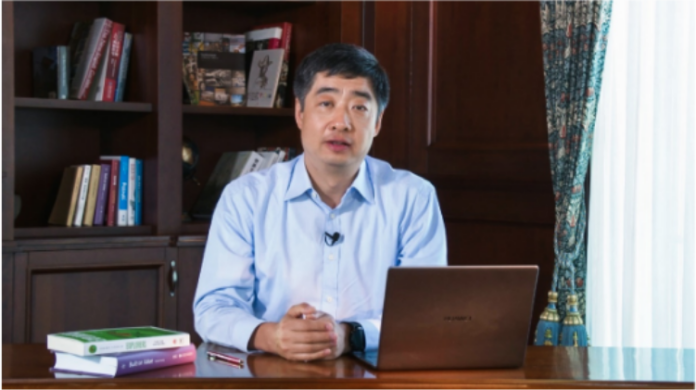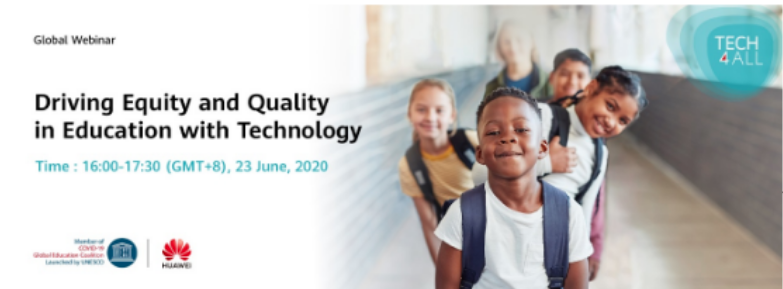Huawei Deputy Chairman Lauds Success of DigiTruck in Providing Digital Skills in Kenya; Announces Expansion to Five Additional Countries
Huawei’s Deputy Chairman Ken Hu outlined its vision and action plan for education under its digital inclusion initiative TECH4ALL at the Global Education Webinar entitled “Driving Equity and Quality with Technology”, emphasizing that “connecting schools and skills development are two key ways for Huawei to improve equitable and quality education.” Showcasing this he pointed to the success of Huawei’s first DigiTruck in Kenya, announcing five additional countries will also benefit in the next two years. The webinar was joined by leaders and experts from UNESCO, GSMA, the Ministry of National Education of Senegal, universities and educational institutions, as well as the private sector.
Improving Equitable and Quality in Education through Technology
Digital technology plays an important role in education. However, 50% of the world’s population still does not have Internet access, and many people lack the skills needed to use digital devices. As a result, the digital divide in education continues to widen. Ken Hu said: “We believe that everyone, everywhere has the right to education and the equality of opportunity it brings. As a technology company, Huawei wants to help with connectivity, applications and skills by focusing on two important areas of connecting schools and developing digital skills respectively.”
In terms of digital skills development, Huawei plans to provide digital skills training for vulnerable groups in remote areas, especially female students, through projects such as DigiTruck in a program called ‘Skills on Wheels.’ Since the launch of DigiTruck in Kenya at the end of last year, it has provided training for more than 1,500 young people and teachers in rural areas.
Huawei plans to replicate the program in France, the Philippines and three other countries in the next two years. “These all solar-powered, mobile classrooms with wireless broadband access can reach even the most remote communities.” Olivier Vanden Eynde, CEO of Close the Gap, the global partner of DigiTruck, said.
The DigiTruck in Kenya is operated by Computers for Schools Kenya and works together with the Ministry of ICT’s Ajira initiative, Safaricom’s Blaze initiative, UNESCO and other partners. Participants learn how to use computers and office software, how to use the internet to find and do work online, how to learn and develop their careers online, how to be safe online, how to buy and sell their goods online, and how to be safe online.
During the webinar Huawei’s Deputy Chairman Ken Hu showcased the success of the DigiTruck’s training in Bomet County before the pandemic, and shared a video case study of Sharon Chepng’eno, who is deaf, but who has committed to take the skills she has learned and share them with other people with disabilities.
“The digital skills that the DigiTruck helped provide before the pandemic struck have never been more necessary now that even more of life and work is necessarily happening online. As Kenya’s digital transformation gathers pace, it is critical that every single Kenyan is prepared for this, and our research has shown that digital skills are currently a very significant challenge for many. We thank our partners in Kenya who have enabled Huawei’s first DigiTruck to be so successful that now Huawei is going to scale-up our support to other countries.” Said Mr. Stone He, Huawei Kenya Chief Executive officer
Stepping up efforts in response to Covid-19
The Huawei ICT Academy launched its “Learn ON” program in early April, aiming to address the educational needs of University-based ICT talent affected by the epidemic. The program brings together global university partners and offers college cooperation incentive funds, which can be used for online courses and examinations, online experiments, etc., and provides more than 130 Massively Open Online Courses (MOOC) resources, covering cutting-edge technology fields such as artificial intelligence, big data, 5G, and the Internet of Things. Here in Kenya 30 Universities are Huawei ICT Academy partners, over 500 students have taken advantage the resources and benefitted from the “Learn ON” program.
Public-private cooperation accelerating the resolution of education issues
The Global Education Webinar focused on the two topics of “Distance Learning for Better Education Continuity” and “ICT Innovation for Inclusive Learning”. The best practices and experience of China, France, Luxembourg, Senegal, Kenya, South Africa and other countries were shared and discussed and Borhene Chakroun, Director of UNESCO’s Policy and Lifelong Learning Systems, reiterated that “with at least 63 million primary and secondary teachers affected, the COVID-19 pandemic has highlighted the need for developing teachers’ capacity to effectively engage in distance learning, which will become part of the education and training provision in the future”.
In addition, participants reached a consensus that public-private cooperation is the key to promoting inclusive education by digital technology. “Many lessons have been learnt this year in low- and middle-income countries, adapting services to address the needs of users and responding to the impact of the global pandemic by evolving business and critical partnerships.
The GSMA and the mobile industry are supporting the current situation, and committed to long-term support of the SDGs (the United Nations Sustainable Development Goal) in the era of ethical leadership.” added by Stephanie Lynch-Habib, Chief Marketing Officer, GSMA.
To achieve greater digital inclusion in the education field, it requires cross-sector efforts by governments, industry organizations, educational institutions, and technology companies to contribute their respective experiences and resources. This will ultimately accelerate the achievement of SDG 4 (“Ensure inclusive and equitable quality education and promote lifelong learning opportunities for all”) by 2030.
To find out more about the Global Online Education Webinar, click here to watch the video.
To watch Ken Hu’s speech and read his blog post on education, please visit https://blog.huawei.com/2020/06/23/driving-education-equality-with-technology/










